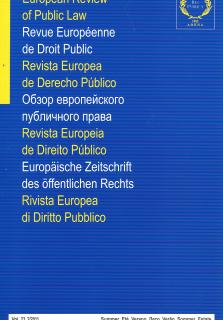
Constitutional Law / Droit constitutionnel
The present chronicle observes the main legislative changes in Georgia in 2010. The chronicle briefly describes the new wave of democratic reform related to the Constitution of the country and the tax code. With the new constitutional changes, the controlling factors of every branch of the government become more clearly defined and the powers are balanced thus guaranteeing the stability and the economic development of the country. The first part of the chronicle considers the mixed European model of Constitution which is devoted to the power distribution among the President, Parliament and the Government of Georgia and aims to devolve power away from Georgia’s traditionally strong presidency. The second part of the chronicle focuses on innovations in tax legislation, which offer taxpayers more sophisticated, simple and secure tax system. The new tax code introduces the concept of micro and small business, which will be subject to a simplified tax regime. Changes also provide new mechanisms in order to protect the rights of taxpayers: tax agents, e-service system and the good faith rule. The reforms made in 2010 once again reaffirm the strong aspiration of Georgia to create a democratic state, best business environment and to establish a socially stable society where each member’s rights will be fully protected.





















